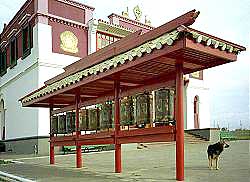Buddhists back more powerful Kremlin
By DAVID HOLLEY, Los Angeles Times, November 28, 2004
ELISTA, RUSSIA -- If anyone in Russia should be expected to defend local self-rule against a new Kremlin bid to centralize power, it is the people of the unique Republic of Kalmykia ? the only predominantly Buddhist region in Europe.
 Mongols who migrated from western China 400 years ago, the Kalmyks brought Tibetan Buddhism, formed an alliance with the czar and settled in a patch of open steppe near the Volga River. During World War II, dictator Josef Stalin grew suspicious of their loyalty and exiled all 100,000 of them to Siberia. After 1957, they were allowed back ? but by then their temples had been razed and their traditions tattered.
Mongols who migrated from western China 400 years ago, the Kalmyks brought Tibetan Buddhism, formed an alliance with the czar and settled in a patch of open steppe near the Volga River. During World War II, dictator Josef Stalin grew suspicious of their loyalty and exiled all 100,000 of them to Siberia. After 1957, they were allowed back ? but by then their temples had been razed and their traditions tattered.
Since the breakup of the Soviet Union, this southern Russian republic has undergone a cultural renaissance led by its elected president, Kirsan Ilyumzhinov. The multimillionaire has rebuilt temples, encouraged the revival of the Kalmyk language and sent youths to India to study Buddhism.
Yet when Russian President Vladimir Putin announced plans recently to eliminate direct elections for the presidency of Kalmykia ? and 88 other governorships and similar posts ? there was hardly a word of protest in this region on the Caspian Sea about 250 miles west of the Ural River, the traditional boundary between Europe and Asia.
Support for Putin
The republic's ruling elite and its main opposition largely are united in a chorus of support for Putin's proposal.
Kalmykia's leaders gave the plan "a very positive reaction," said the republic's deputy prime minister, Valery Akuginov. "I think it's a good idea. There should be a vertical structure of power."
Launched after a series of terrorist attacks, Putin's Sept. 13 proposal, which would allow the president to appoint regional leaders, has been viewed in the United States and Europe as a major step toward greater authoritarianism. But it has provoked only weak domestic opposition, and has drawn a mixed response in public opinion polls.
Kalmykia is unique in many ways, and it reflects the diversity and political complexity of Russia, which sprawls through 11 time zones and includes about 160 ethnic groups. In a kind of bandwagon effect seen across the country, most regional politicians have hustled to align themselves with an increasingly powerful Kremlin by praising the proposal.
The new breed
Politics in Kalmykia swirl around President Ilyumzhinov, 42, who came to power in 1993 as one of Russia's new breed of fabulously rich capitalists, backed by voters who hoped he could do for them what he had somehow done for himself. Those dreams have been dashed, for the republic remains among the poorest in Russia.
Today, Kalmyks are divided between those who support Ilyumzhinov, largely for his cultural contributions, and those who oppose him on political or economic grounds.
In this republic of 300,000 people, about half are ethnic Kalmyks and a bit more than one-third are ethnic Russians. Most schooling is in Russian, but efforts are under way to increase the role of Kalmyk.
Much in Kalmyk culture was lost during the Siberian exile, said Pyotr Nembrikov, 66, a retired construction worker who brought his grandson to a recent service at the Gendun Shedrup Choekhorling Buddhist Monaster on the outskirts of Elista.
"When we came back to our homeland, and especially after President Kirsan Ilyumzhinov was elected, a revival of Buddhism started," Nembrikov said.

 Mongols who migrated from western China 400 years ago, the Kalmyks brought Tibetan Buddhism, formed an alliance with the czar and settled in a patch of open steppe near the Volga River. During World War II, dictator Josef Stalin grew suspicious of their loyalty and exiled all 100,000 of them to Siberia. After 1957, they were allowed back ? but by then their temples had been razed and their traditions tattered.
Mongols who migrated from western China 400 years ago, the Kalmyks brought Tibetan Buddhism, formed an alliance with the czar and settled in a patch of open steppe near the Volga River. During World War II, dictator Josef Stalin grew suspicious of their loyalty and exiled all 100,000 of them to Siberia. After 1957, they were allowed back ? but by then their temples had been razed and their traditions tattered.